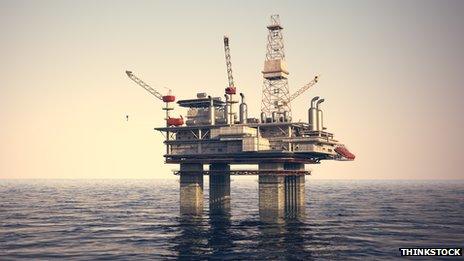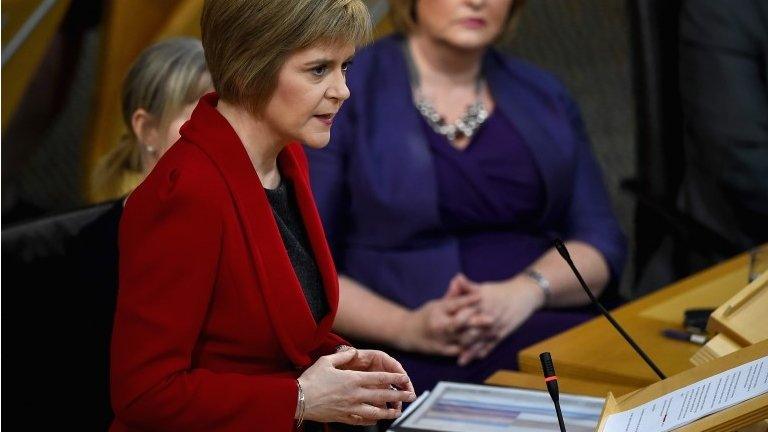Sturgeon's Business Pledge
- Published

Nicola Sturgeon is setting out her own stall on her relationship with business.
Whereas her predecessor was comfortable with boardroom types, that's not the background of the new first minister. As a lawyer, her area of interest was clients at the disadvantaged margins, rather than corporate deal-making.
Being perceived as being to the left of Alex Salmond, there's been some expectation the FM might veer towards more interest in the distribution of income than the generation of it.
Her early statements in the new job have been clear about economic growth being one of her top priorities. Her Programme for Government gives more indication about what that means.
Small housebuilders
It includes £30m more to help the housing market. That's targeted at support for those buying from small-scale developments and developers rather than the big housebuilders.
As you would expect, there's continuity across a range of the Salmond regime's policies, such as investment in infrastructure, a further upward push in the number of modern apprenticeships, and support for innovation, notably in renewable energy.
There's talk of applying the Commonwealth Games' 'One Scotland' approach to joint effort across agencies and government to boosting exports.
What isn't so clear from the Programme for Government is how to tackle the problems of getting wave power to market, which has become more urgent.
As the programme document briefly states, a forum has been set up to find room for collaboration between wave power firms and with university researchers. Some people from Pelamis may be employed by it, but this is a strategically important area, and with a struggle to find investors, it's not looking healthy.

There's talk also of the oil and gas industry, but little acknowledgement of how quickly it's gone from the key driver of the Scottish economy, with record levels of investment, to a big worry.
With a barrel of Brent crude plummeting to less than $80, this is likely to become a significant issue for the new first minister.
A lot of factors are out of her control, starting with the OPEC talks this week, and then the new tax regime for UK offshore oil and gas, which is expected next week, and which the industry sees as vital to avoiding a big North Sea crunch.
And falling into the category of vague commitments is the creation of a Scottish Business Investment Bank. The Scottish government will continue to "develop options", though it is pointed out that it's already doing much of that work under different branding.
Fairness and equality
The main thrust of the economic chapter of the Programme for Government is around fairness and gender equality. At least to some extent, it reflects that view that Nicola Sturgeon is more interested in who gets the income than how to generate it.
And to some extent, these issues run in tandem. More childcare provision is seen, by the Scottish government, as the means of bringing more women into the workplace, thus driving economic growth. It doesn't come free, of course, or cheap.
One initiative, that may turn out to be significant, is a Scottish Business Pledge. It says that if a company wants support from Scottish Enterprise or Highlands and Islands Enterprise, it needs to get with the Scottish government's priorities.
That includes the Living Wage, youth employment, no zero-hours contracts, a commitment to innovate and export, support for youth skills, a push towards better gender balance at the top and in pay structures, more workforce engagement (probably meaning the boardroom, for which a Fair Work Commission is being set up) and support for the local community.
They're all worthy causes, for which the government has a mandate. But it's also quite a daunting checklist for all companies to pledge allegiance to, if they want government support. And if they don't? We'll see.
'Harness, not dampen'
The response from Labour's Jackie Baillie was to push further, challenging the first minister to force companies to publish figures on how fair their pay structures are.
And that tone of hostility to business was strongest on land reform. You don't get far in Scottish politics by standing up for the owners of big shooting estates. So they're getting a heavy dose of radical land reform, including an end to their exemption on business rates.

Scottish Land and Estates, which represents their interests, has hit back that they are too often seen in a negative light, rather than as businesses helping support tourism, jobs and the environment.
They've said they'll "engage enthusiastically" in consultation, which doesn't mean it will be amicable.
The Federation of Small Businesses welcomed some elements, but hinted at unhappiness at the direction of travel when it said "we need to harness, not dampen, the power of enterprise".
Council Tax
Perhaps the most interesting development, money-wise, has been the retrieval from the long grass of the long-standing pledge to ditch the "hated" council tax, and replace it with something better related to the ability to pay.
For the SNP, that used to mean a local income tax, but on closer inspection, the idea looked like it could become far too complex and politically troublesome.
The Greens have long been pushing for a Land Valuation Tax, which has gained some traction in recent years. And with their closeness to the SNP, it may get closer scrutiny still, when a commission is set up early next year, to report in autumn.
That could be seen as kicking the issue further into the long grass, except it looks more like a challenge for the 2016 Holyrood manifesto writers.
The most interesting bit is that this is one bit of the Programme for Government in which Nicola Sturgeon wants to engage with opposition parties. Labour has been horribly tied in knots over this issue in the past, and the others sense danger too.
Any system, particularly one aimed at greater fairness, will mean some people pay more and some people pay less. As a hard and fast rule, the people who pay less won't thank the government much for it, while those who pay more will complain very loudly.
This is a poison chalice Nicola Sturgeon wishes to share round the Holyrood debating chamber.
- Published26 November 2014
